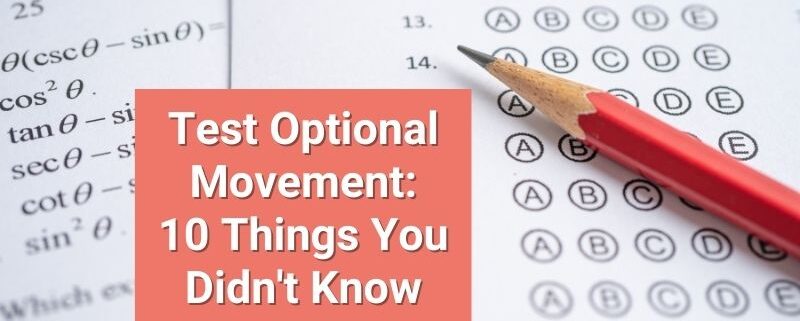10 Things You Might Not Have Known About the Test Optional Movement
ACT and SAT testing has been part of the college application process for a long time. Since COVID, the test optional movement has been a huge part of the conversation. In honor of our tenth year in business, we’re continuing our series of “top 10” blog posts with a look at the top 10 things you might not have known about test optional.
1) The test optional movement has been around since 1969 when Bowdoin College was the first college to go test optional. Several other small liberal arts colleges followed this anti-testing idea. FairTest.org started tracking test optional colleges in 1985.
2) 84 college campuses are “test blind.” These institutions will not consider a student’s test scores—even if the student submits them.
3) As of this writing, FairTest.org reports 1,900+ accredited, 4-year colleges with test optional policies. Prior to COVID in fall of 2019, they were excited about reaching a record number with 1,050.
4) An institution may declare that they are test optional and still have certain majors, merit scholarships, or honor programs that require the submitting of a test score. They may also require scores for out-of-state students, for academic placement, or when students don’t meet certain minimum GPA or class rank. Visit the college’s webpage for the most accurate information.
5) A majority of students still report test scores even after a college goes test optional. As an example, Emory reported that “31% of students ADMITTED to the Class of 2026 chose NOT to submit SAT or ACT scores.” Unfortunately, many colleges are not as forthcoming about how many of the students offered admissions submitted test scores.
6) Initial numbers post-COVID do seem to indicate that test optional policies have led to a more diverse applicant pool at some colleges. Previously, students would simply not apply to schools where they felt their scores weren’t good enough. Now, colleges are getting the chance to review more diverse candidates.
7) Colleges don’t automatically assume that students are less qualified simply because they don’t submit scores. Test optional colleges recognize that a student may feel their test scores simply do not reflect their best work.
8) Some institutions will ask for additional information in lieu of test scores like an additional essay, letter of recommendation, or AP/IB test scores.
9) Homeschool students will have a harder time applying test optional because they lack the transcript and GPA that is easily compared to students attending public or private school.
10) The pandemic did not put an end to the ACT and SAT. Students are still submitting scores, and even students at disadvantaged school districts can use strong scores to show they are ready for college. While research is still being done on whether standardized test scores are a predictor of college success (it depends on who you ask!), we know for sure that the testing agencies are not going anywhere for the time being.
Want more information about test optional and what it means for you? Check out our blog post.
Don’t miss our ACT/SAT/PSAT: The Ultimate Family Planning Guide webinar. This deep dive can help your family create a game plan for testing success and answer all your questions.
Updated 2/2024
Enjoy this post? Don’t want to miss any future blogs about education, college, or careers?



